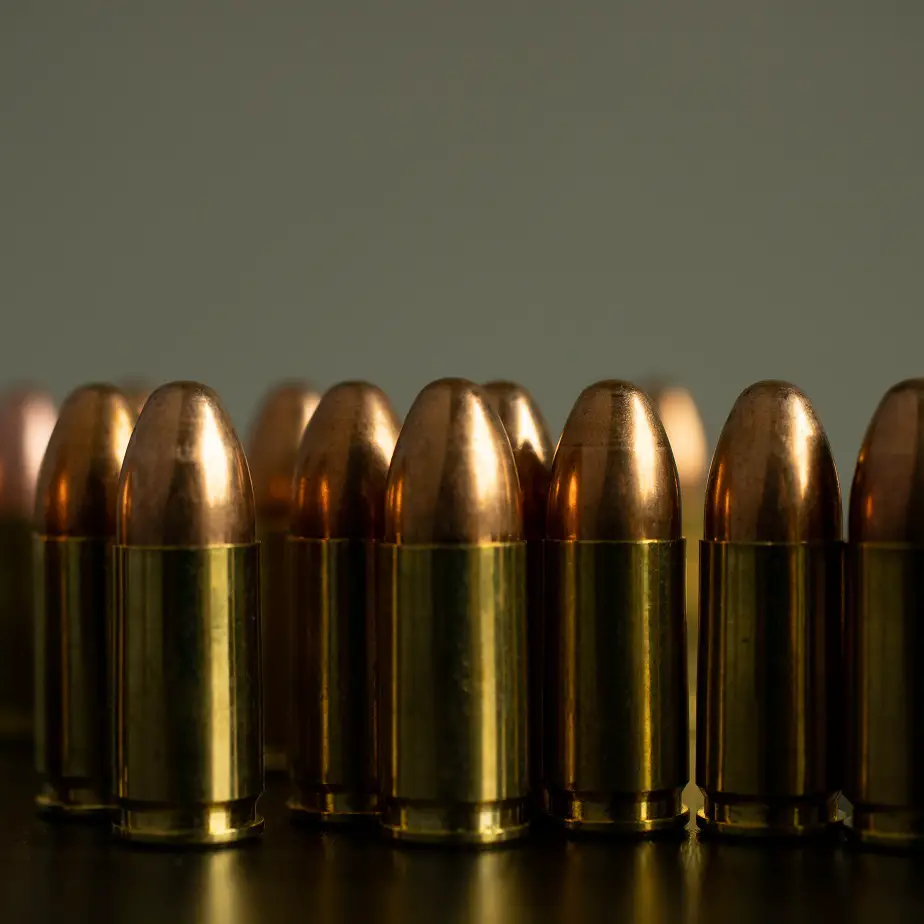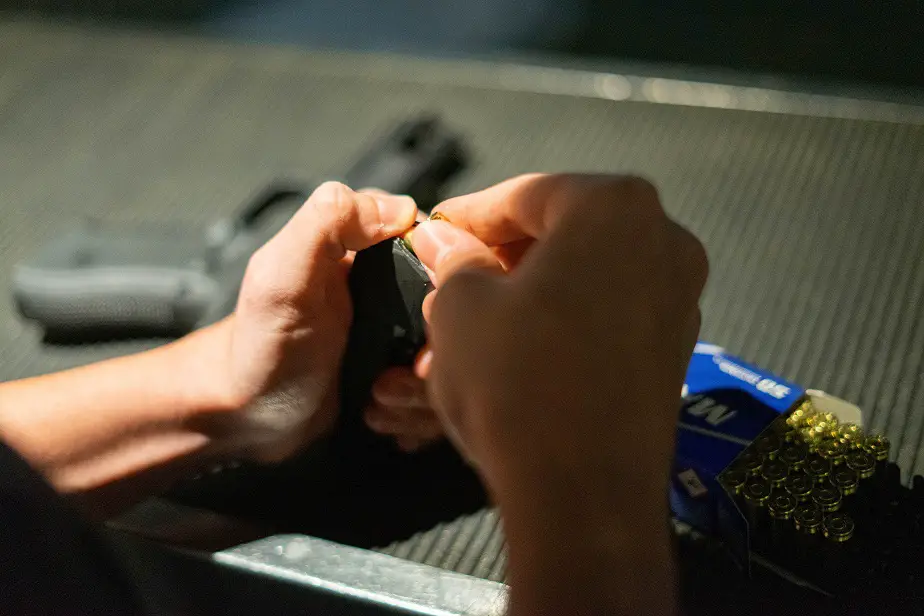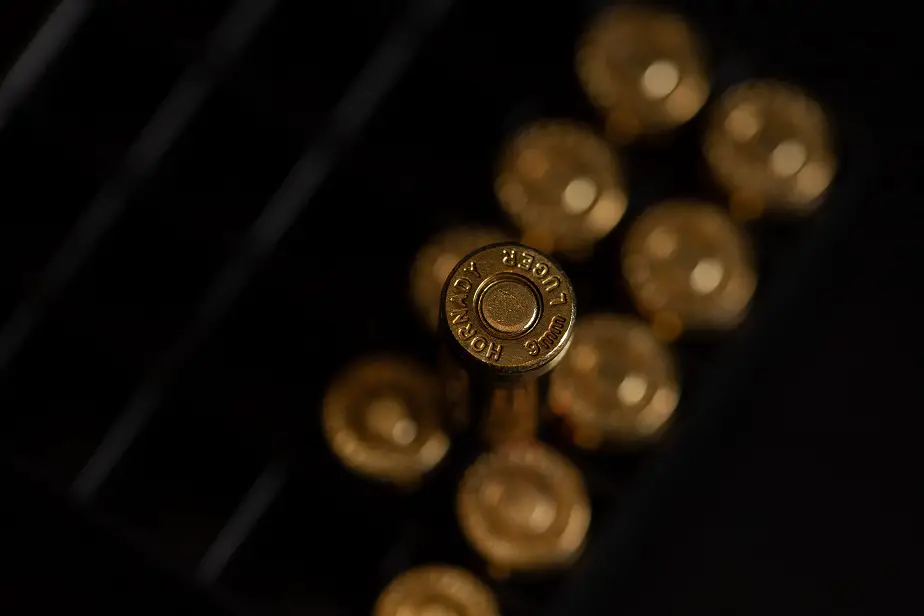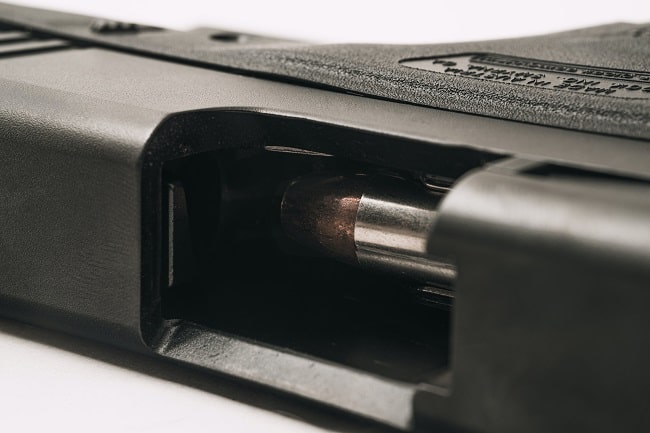My pals and I have shot an awful lot of 9mm. Everybody has an opinion about the best ammo. A few are actually right. I’ve put the time into actually researching it for my benefit, and for yours.
Most experts recommend a .356 or a .357 diameter bullet for a Glock 19. The bore on a Glock tends to be a bit larger than most 9mm pistols. Because of this, a non-standard bullet of .356 or .357 caliber is often recommended. Choose the most accurate one that doesn’t show signs of overpressure.

Why do Glocks Need a Bigger Bullet to be Accurate?
Glock is one of the most popular and well-known pistol manufacturers in the world. People who don’t even know guns know Glock. Glocks have a reputation of being completely reliable. To get that reputation, they have to compromise some on the precision of their guns.
A pistol that is built with very tight tolerances, while accurate, is slightly more prone to jam up. Glock’s entire gun is built with poor and dirty shooting conditions in mind. If the gun is wet, muddy, or icy, it’s going to fire and cycle more reliably than a lot of others.
They are built more to a military specification. One of the thoughts that went into its design is the slightly overbored diameter of the bore. A standard bullet (.355 caliber) will be ever so slightly loose in the barrel. That’s part of the military production theory.
You see, bullet manufacturing is fairly easy to control right now. However, during tomes of war or conflict, manufacturing has to increase and quality will suffer a tad. Bullets will be less consistent if produced faster. Some will be a bit small, and some will be a bit big.
The whole reason behind Glock’s overbore thing is a safety issue. If during wartime production, bullets come less consistent, soldiers will end up chambering a round that’s out of spec. if it’s a small bullet, no big deal. If it’s a bigger bullet, it will be too tight.
Too tight of a bullet will cause extra pressure in the barrel and chamber. If you couple this with a hot, dirty pistol, you may be mixing up a pot of trouble. Glock takes this into account as a possibility and designs their pistols ever so slightly differently because of it.
For the shooter who isn’t worried about getting caught with a dirty gun on a hot day, it’s not a problem. In fact, there are steps we can go in the opposite direction to add to the accuracy of the gun.
Disclaimer: before you do this, you should know for sure the diameter of your bore. You might find the same numbers I did, but at least it will be fun to do In order to find the diameter of your bore, you need to slug your barrel. If you’re unfamiliar with that term, you ram a pure lead bullet (a slug) down the bore and carefully measure its diameter to the nearest one-thousandth of an inch with a really good caliper or micrometer.
It is my experience that a 9mm Glock barrel will slug out to .355 with a pure lead slug and more like .356 with a harder lead alloy. The reason the alloy measures differently is because it has some spring back after being compressed in the bore. Lubricate the slug with oil so it won’t get stuck.

What Bullet weight is the Most Accurate in a Glock 19
The general consensus is that the 124 grain bullets tend to be the most accurate in a Glock. Almost any time someone asks what the most accurate ammo is for a 9mm Glock, they are recommended to give 124 grain options a try.
I have found good results with the heavier ammo. Both the 124 and 147 grain ammo shoots more accurately than the 115 grain stuff. Most shooters favor the 124 grain over the 147 though.
Most Accurate Factory Ammo for the Glock 19
By taking an overview of good shooters and the ammo they prefer for accuracy, we can get a pretty good idea of what will probably work well in your pistol. It may or may not be the case with your gun, but it’s certainly a better bet to make.
One of the loads I have heard highly recommended for a Glock 9mm is Speer Gold Dot. Speer makes good bullets, and loads their ammunition to high standards. No doubt about it. the funny thing is that 9mm gold dot is .355 caliber. that’s the same diameter as the bore on a 9mm Glock
For best results, you want the bullet to be one-thousandth an inch (.001 caliber) larger than the diameter of the bore as measured from the grooves in the rifling. Still, the Gold Dot ammo from Speer is highly consistent.
Magtech is a good brand for quality target ammo at a lower price. Browning Performance is also quite consistent.
If you’re looking for something more penetrative against armor or covered targets, Underwood Ammo makes the Extreme Penetrator round which is significantly better. Although, any certified level 3 armor will stop it.

Most Accurate Hand Loads for the Glock 19
Well, this is tricky here. I could go on forever about different recipes of powder, brass, bullet and primer that people use. Since most 9mm hand loaders are not loading for hair splitting accuracy, it’s hard to nail down a few standard options that seem to work most times.
What I will say is that with handloading, you have an option to use less common bullet diameters. Most 9mm bullets in factory-loaded ammo are going to measure .355 caliber (inches) in diameter. But a lot of companies make .356 caliber bullets for handloading, marketed specifically for the 9mm.
Here is a tip. We don’t have to look just at bullets marked for 9mm either. 380acp bullets are usually .356 caliber and nicely rounded. 38 SUPER is an old revolver cartridge that also shoots a .356 caliber bullet and at 130 grains, it’s not necessarily a poor choice.
You will want to stick with a bullet that has some sort of a round or cone shape on the front to it to ensure it feeds in a semi-automatic pistol.
If you want to try loading with .357 caliber bullets, they will probably be labeled as 357 magnums. They can still shoot out of the barrel, but they’re going to be a bit tight unless you slugged your bore at around .356. remember, you want ideally one-thousandth of an inch overbore size.
If you really want to have some fun, then you need to get yourself a bullet mold and begin casting your own bullets. Casting is tricky at first, but with a little practice, you can cast thousands of perfect lead, or lead alloy bullets.
Bullet molds are available from a lot of machining companies, but the most popular places to get them are Lyman and LEE. Lyman is a bit better and LEE being cheaper. You can get molds for multiple bullet shapes and weights in .355, .356and .357 caliber.
When using cast bullets, that’s when it’s often better to try the tighter .357 bullets. This is especially so with a softer lead alloy or pure lead. And yes, you can shoot lead out of a Glock. Just clean it well when you’re done.
Quick Tips to Make Your Glock 19 More Accurate
Trigger polishing- You can greatly improve your Glock by lessening the friction on the trigger bar. If you disassemble the pistol and take a look, you can see all the points the trigger bar contacts another part. You’ll need some Q-tips, auto polish, and about 20 spare minutes.
Put a dab of polish on the Q-tip and polish the points of contact until you get a mirror finish. Polish every spot well. Be sure and clean off the polish grit when you are done. Hot water works well. when you’ve polished everything, lubricate it with light oil, or if you want to the best, some molybdenum or moly grease.
I wrote a full-length article on the DIY Glock trigger polishing job. Here’s the link to it
Keep the trigger clean and lubed- I can’t believe how many times I have tried someone else’s gun and hear grit grinding as I’m pulling the trigger. Grit, sand, and powder residue will accumulate and stick to the oil. Every time the trigger is pulled, the grit is roughing up the contact surfaces, adding friction.
I don’t know why some people insist on never cleaning their guns. keep that puppy clean. Wipe down the entire trigger bar and the area around a bit until it’s clean and shiny. When you are field stripping your pistol, check behind the trigger bar and around the trigger for debris.
Remove copper fouling
Copper fouling is a common cause for a gun suddenly losing accuracy and not performing well. copper or brass from the jacket of a bullet will rub off in the barrel and over time, cause the barrel to be a smaller diameter. Every once in a while, it needs to be removed.
Lead does the same thing, but quicker. If you look at the barrel, you can usually see metal fouling beginning to build up in streaks along the rifling. To remove metal fouling, use a cleaner like Hope’s gun cleaner. It has ammonia in it to remove brass, copper, and lead. If it’s really bad, they sell copper solvent too.
Put a metal bore brush on your cleaning rod and dip it in the gun cleaner or solvent. Run it up and down the barrel a few times. Then, run a few patches down the barrel. Repeat until the patches and barrel are visibly clean.
Just as a side note, don’t be afraid to shoot lead bullets through your Glock, as long as you clean it when you are done. lead fouling happens quicker than the harder metals, but it still takes a long time to create an unsafe situation.

